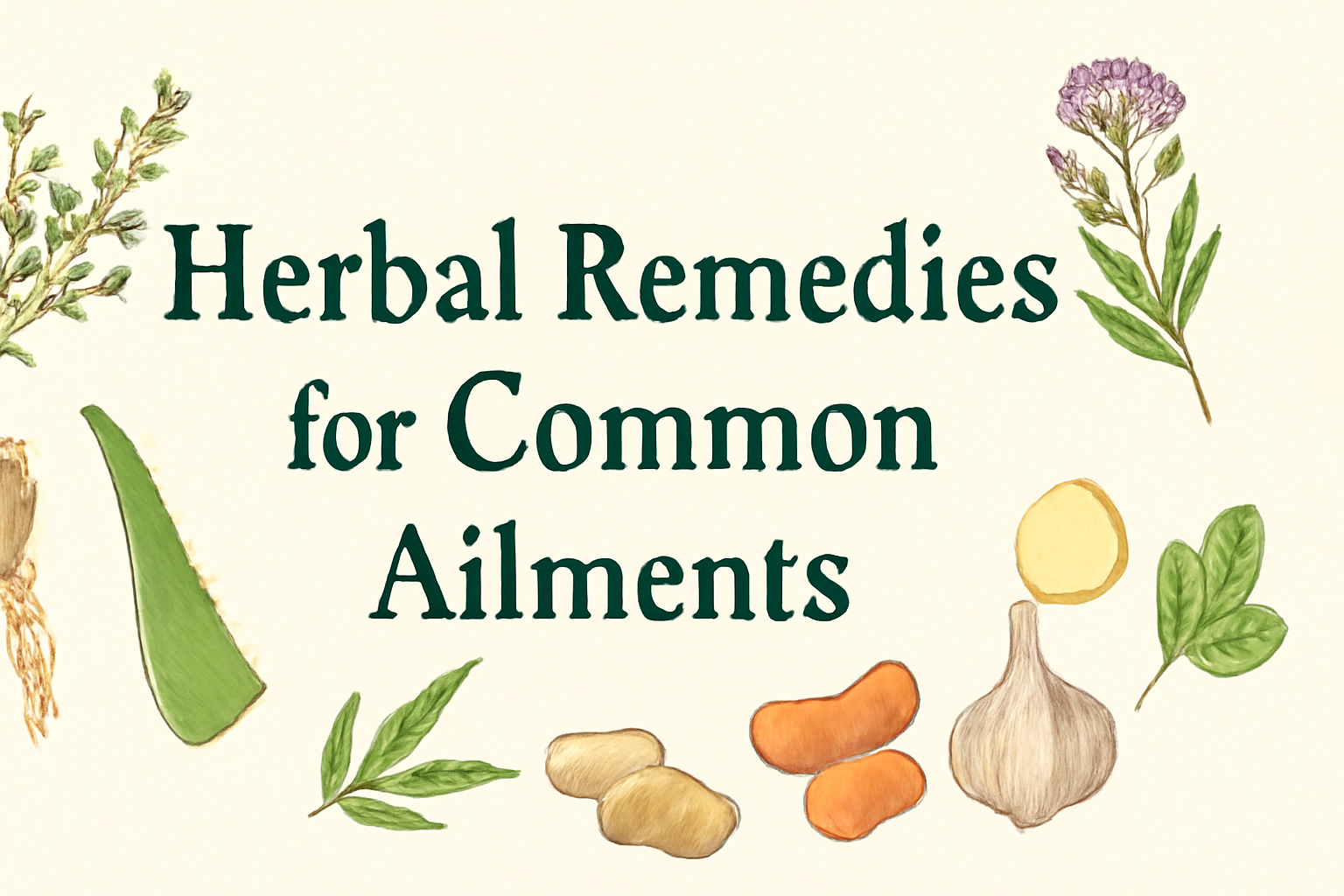Herbal remedies for common ailments offer natural solutions to everyday health issues. Explore top herbal treatments for headaches, digestive problems, and more in this comprehensive guide. Discover the healing power of nature!
With a changing world and everyone looking to treat their problems through natural ways, this is the place to alleviate daily health issues. Herbal cures, at the basis of millennia of heritage, provide handy and environment friendly options for frequent fitness issues. A Complete Herbal Guide -A complete guide to some of the better-studied herbal remedies for digestive issues, stress and sleep problems, skin diseases, etc.
Understanding Herbal Medicine
Phytotherapy is defined as the use of plant-based substances to promote health and treat illness. Pharmaceutical drugs are typically too potent and have severe side effects, whereas herbal medicines are relatively milder and even used preventively. Be sure to speak with your provider before starting any new herbal regimen, especially if pregnant, nursing, or taking a medication.
1. Digestive Health
Peppermint (Mentha piperita)
Peppermint is most famous for helping with digestion. It may relieve the symptoms of irritable bowel syndrome (IBS), as well as bloating and indigestion. Peppermint tea or enteric-coated capsules can relax muscles of the digestive tract and reduce gas production, relieving symptoms.
Ginger (Zingiber officinale)
Ginger is an anti-inflammatory that can also relieve nausea, vomiting, and indigestion. When it comes to motion sickness and morning sickness during pregnancy, it works particularly well. Drinking ginger tea or making sure to include fresh ginger root in your meals promotes digestive health.
Chamomile (Matricaria chamomilla)
Chamomile is a common remedy for settling a troubled stomach or indigestion. Chamomile tea is also a popular evening drink because its antiinflammatory effects can soothe the digestive tract.
2. Stress and Anxiety Relief
Ashwagandha (Withania somnifera)
Ashwagandha is an adaptogenic herb that will help your body adjust to stress. Research into its health benefits showed it lowers cortisol (our main stress hormone), helping to create a feeling of calm and a better sense of well-being.
Lavender (Lavandula angustifolia)
Lavender is an infusion that has a calming effect as well. Lavender essential oil is used in aromatherapy to reduce anxiety, enhance sleep, and alleviate the symptoms of depression. Relieve Stress Lavender tea also helps in relieving stress.
Lemon Balm (Melissa officinalis)
Lemon balm, a mild sedative, known to alleviate anxiety, and promote sleep. It is frequently combined with other alternative calming herbs to increase its potency.
3. Sleep Disorders
Valerian Root (Valeriana officinalis)
A popular remedy for insomnia and sleep improvement, valerian root is often taken in supplement form. The science behind it is that it boosts the levels of a neurotransmitter in the brain, gamma-aminobutyric acid (GABA) which is responsible for relaxes us.
Passionflower (Passiflora incarnata)
Another herb that has sedative properties is passionflower. It may even make you fall asleep a little more quickly to neutralise or unwind the effect of tension and assist you with insomnia.
4. Immune System Support
Echinacea (Echinacea purpurea)
Echinacea is thought to boost the immune system and may help to shorten the duration and severity of colds. It works best at the first sign of symptoms.
Garlic (Allium sativum)
Garlic possess Anti-microbial properties and also beneficial in boosting immune function. Garlic can ward of colds and other infections if eaten on a regular basis.
5. Skin Care
Aloe Vera (Aloe barbadensis miller)
Aloe vera is known for its healing and soothing properties. The result is an effective treatment for sunburns, minor burns, and skin irritations When applied consistently to the skin, aloe vera gel helps the skin heal and minimizes swelling.
Tea Tree Oil (Melaleuca alternifolia)
Tea tree oil has been used for obvious purposes such as an antiseptic, and for the treatment of acne and fungal infections. May be used topically but should be diluted to avoid irritating the skin.
6. Pain Management
Turmeric (Curcuma longa)
Curcumin is the magical compound in turmeric which is said to possess strong anti-inflammatory properties. Relief from aches and symptoms of arthritis and muscle soreness Curcumin is best absorbed in the presence of black pepper; thus, consuming turmeric with black pepper greatly increases absorption.
Willow Bark (Salix alba)
For centuries willow bark has been used for its pain and inflammation-relieving properties. Salicin works like aspirin and also is proven effective for headaches and back pain.
7. Respiratory Health
Eucalyptus (Eucalyptus globulus)
Eucalyptus oil is often used to help clear cold and respiratory symptoms. This brings about nasal clearance and aids in aid and breathing because of its antimicrobial nature.
Thyme (Thymus vulgaris)
Thyme thyme is an herb to relieve coughs and bronchitis thanks to its expectorant properties. People commonly use it in herbal syrups and teas that support the respiratory system.
FAQ’s
1. What are herbal remedies?
Herbal remedies involve using plant-based substances, such as leaves, roots, flowers, and seeds, to treat common health issues. They have been used for centuries in traditional medicine to promote wellness and manage various ailments. Unlike pharmaceutical drugs, they typically come with fewer side effects.
2. Are herbal remedies safe?
Herbal remedies are generally safe when used appropriately, but they may interact with medications or cause side effects in some individuals. It’s important to consult a healthcare provider before using new herbal remedies, especially if you have underlying health conditions, are pregnant, or are on other medications.
3. How can herbal remedies help with digestive issues?
Herbal remedies like peppermint, ginger, and chamomile can help ease digestive discomfort, such as bloating, nausea, and indigestion. Peppermint, for example, relaxes the muscles of the digestive tract, while ginger is known for its anti-nausea effects. Chamomile calms the stomach and promotes overall digestion.
4. What are the best herbs for managing stress and anxiety?
Some popular herbs that help reduce stress and anxiety include ashwagandha, lavender, and lemon balm. Ashwagandha is an adaptogen that helps the body cope with stress, while lavender has calming effects when used in aromatherapy or tea. Lemon balm is a mild sedative that can promote relaxation and improve mood.
5. Which herbs can help improve sleep quality?
Herbs like valerian root and passionflower are widely known for their ability to improve sleep. Valerian root increases GABA levels in the brain, helping to promote relaxation. Passionflower has mild sedative effects, making it helpful for reducing insomnia and promoting better sleep.
6. Can herbal remedies boost the immune system?
Yes, certain herbs like echinacea and garlic can help strengthen the immune system. Echinacea is known to reduce the severity and duration of colds, while garlic contains antimicrobial properties that may help prevent infections.
7. What herbal remedies are effective for skin care?
Herbs like aloe vera and tea tree oil are excellent for treating skin issues. Aloe vera is known for its soothing and healing properties, making it effective for treating sunburns and minor burns. Tea tree oil has antiseptic qualities and is commonly used for acne and fungal infections.
8. How can herbal remedies help with pain relief?
Herbs such as turmeric and willow bark are commonly used for pain management. Turmeric contains curcumin, an anti-inflammatory compound that can relieve pain associated with arthritis and muscle soreness. Willow bark, which contains salicin (similar to aspirin), can alleviate headaches and back pain.
9. Are herbal remedies effective for respiratory conditions?
Yes, herbs like eucalyptus and thyme are effective for managing respiratory issues. Eucalyptus oil can help clear nasal passages and ease breathing, while thyme is known for its expectorant properties, helping to treat coughs and bronchitis.
10. How should I use herbal remedies?
Herbal remedies can be consumed in various forms, including teas, capsules, tinctures, oils, or topical applications. For optimal results, it’s essential to follow recommended dosages or consult with an herbalist. Always start with small amounts to gauge how your body reacts.
11. Can I use herbal remedies alongside conventional medications?
It’s important to be cautious when using herbal remedies alongside conventional medications, as there can be interactions. Always consult with your healthcare provider before combining herbal treatments with prescription or over-the-counter medications to avoid potential side effects.
12. Where can I buy herbal remedies?
Herbal remedies are widely available in health food stores, online retailers, and specialized herb shops. Be sure to buy from reputable sources to ensure the quality and purity of the herbs. Organic or sustainably sourced products are often preferable.
Conclusion
Natural herbal remedies provide an effective solution to the common ailments in day-to-day life. With this, you can indirectly give your body a chance to heal naturally with a little help from these herbs served on a plate. As per rule of thumb, always contact your doctor before going for any new herbal medicine, particularly when you are having any health conditions already or taking any additional medicine.
Herbs have been used as complementary treatment for many ailments, to learn about them visit trustworthy websites and consult a licensed herbalist or healthcare provider. Stay with us for more information!


